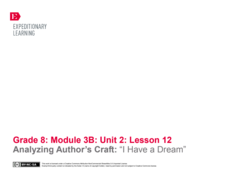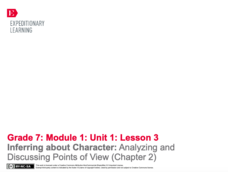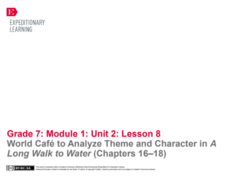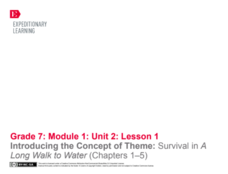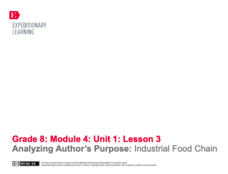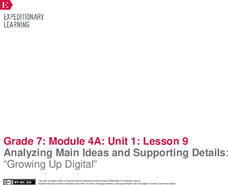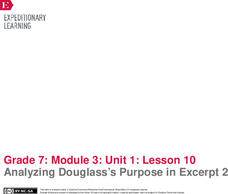EngageNY
Analyzing Theme: The Invisibility of Captives during WWII
Can you see me now? Scholars discuss two definitions of invisibility and then connect the definitions to text evidence related to Louie's invisibility in Unbroken. Readers turn their attention to The Life of Miné Okubo and record text...
EngageNY
Analyzing the Power of Different Mediums: A Mighty Long Way
Weigh the pros and cons. Class members continue sharing their thoughts on media and events by watching the video John Chancellor Reports on the Integration at Central High School. They discuss the advantages and disadvantages of gaining...
EngageNY
Analyzing Author’s Craft: “I Have a Dream”
It's time to make some connections! Scholars complete a close reading of the speech I Have a Dream by Martin Luther King, Jr. They use an I Have a Dream Speech Gist Note-catcher, and I Have a Dream text-dependent questions to guide their...
EngageNY
Informational Essay Planning: Analyzing and Selecting Evidence
Class members look again at the end-of-unit essay prompt for A Mighty Long Way. After reviewing the requirements of the essay, they use their Gathering Evidence note-catchers and color-code the evidence that matches the two questions in...
EngageNY
Analyzing an Author’s Craft: Carlotta’s Journey to Justice
What's an appropriate response? Scholars open the text A Mighty Long Way to see how Carlotta responded to racism, discrimination, and abuse. They work in pairs to answer questions regarding her responses. To finish, they use the Dignity...
EngageNY
Analyzing an Author’s Craft: Carlotta’s Journey to Justice
Find your voice. Readers look at a passage from A Mighty Long Way and discuss what it means for Carlotta to find her voice. After discussing figurative language and idioms, learners listen to the song "This Little Light of Mine" and...
EngageNY
Inferring about Character: Analyzing and Discussing Points of View (Chapter 2)
Readers engage in discussion with partners to answer questions about A Long Walk to Water by Linda Sue Park. Next, they complete exit tickets, writing about how the author creates different points of view for her characters.
EngageNY
Practicing Structures for Reading: Gathering and Using Evidence to Analyze Salva’s and Nya’s Points of View (Chapter 4)
Class members discuss the gist of chapter four of A Long Walk to Water by Linda Sue Park with a partner and share their responses with the class. Next, they complete graphic organizers to answer text-dependent questions based on a close...
EngageNY
Mid-Unit Assessment: Gathering and Using Evidence to Analyze Points of View in A Long Walk to Water (Chapter 5)
Class members discuss how culture, place, and time influence a character's identity in A Long Walk to Water by Linda Sue Park. Then, as part of a mid-unit assessment, they complete a Gathering Evidence graphic organizer to answer the...
EngageNY
Inferring about Character: Analyzing and Discussing Points of View (Chapter 2)
Welcome to the World Café! Readers discuss A Long Walk to Water by Linda Sue Park. They circulate throughout the classroom, stopping at different tables to answer a discussion prompt with their classmates and record their ideas on a chart.
EngageNY
World Café to Analyze Theme and Character in A Long Walk to Water (Chapters 16–18)
Here comes a surprise ending! Readers discuss their thoughts about the ending of A Long Walk to Water by answering probing questions. They participate in a World Café where they work in triads to complete a chart and a prompt during...
EngageNY
Analyzing the Central Ideas, Part 1: “The Border”
What is your strategy? Scholars read "The Border" and work with a partner to practice reading strategies to use while independent reading. They identify difficult parts where they practiced rereading by marking them with sticky notes,...
EngageNY
Analyzing the Central Ideas, Part 2: “The Border”
Writers use the Short Response Graphic Organizer: The Border to learn how to answer short response questions. After completing the organizer, they rotate among classmates conducting peer critiques of their work.
EngageNY
Analyzing Text Structure: “Generation Z Stereotyped”
Breaking the stereotype. Readers use the Generation Z Stereotyped Structure anchor chart and find the central idea of the text. They then read Generation Z with partners and discuss the text using guiding questions. Finally, they answer...
EngageNY
Analyzing Author’s Purpose: Industrial Food Chain
Using an Author’s Purpose anchor chart, groups examine a variety of text to determine the author's purpose. They then apply what they have learned to The Omnivore’s Dilemma. In pairs, they discuss what the text is about and why it was...
Radford University
How to Calculate and Analyze the Equation for a Parabolic Path
Working in groups, pupils plot three points on the coordinate plane representing three different parabolic paths. Using a calculator, they determine the quadratic regression equation for their models. Each team then figures out the...
EngageNY
Analyzing Character: Who is Lyddie?
Character analysis can help readers feel more connected to a literary text. Scholars explore the topic by writing an acrostic poem about the main character from Katherine Paterson's novel, Lyddie. Then, pupils watch a short video to help...
EngageNY
Analyzing Textual Evidence: Working Conditions in the Mills
Deafening, dusty, debris. Such were the working conditions in the 1800s textile industry as portrayed in Katherine Paterson's novel Lyddie. Scholars watch a short video clip about life and work in the mills. Next, they work with partners...
EngageNY
World Café to Analyze the Characters in Lyddie
Order up! Welcome to the World Café, where scholars engage in small-group discussions based on Katherine Paterson's novel Lyddie. As pupils circulate around the room, they talk with classmates about the novel's characters, setting, and...
EngageNY
Analyzing Character: Launching Pygmalion, Part 2
Readers of Pygmalion use Eliza Character Tracker Parts one and two to notice and wonder about character analysis. They read text excerpts and mark details that show how Eliza feels and why she acts in certain ways. To finish, they answer...
EngageNY
Analyzing: Key Scenes in Pygmalion
Class members work on Pygmalion section seven text-dependent questions. They then act out part of the play in a reader's theater and finish the instructional activity by revisiting their Eliza Character Trackers, adding any new...
EngageNY
Analyzing Main Ideas and Supporting Details: “Growing Up Digital”
Young scholars continue their exploration of adolescent brain development by reading an informational text, "Growing Up Digital," by Matt Richtel. Then, with partners, they complete note-catcher worksheets to capture the article's main...
EngageNY
Analyzing Douglass’s Purpose in Excerpt 2
Learners revisit Plantation Life to focus on Douglass's purpose and choices he made for writing the text. They complete text-dependent questions, an analysis note catcher, and finalize their thoughts by sharing out with the class.
EngageNY
Analyzing Douglass’s Purpose: Learning to Read
Three for three. Groups of three complete Analysis note catchers that cover excerpt three of Narrative of the Life of Frederick Douglass. Before beginning, learners discuss group work by looking at the excerpt analysis role document and...
Other popular searches
- Analyze Portraits
- Analyze Characterization
- Analyze Maps and Charts
- Analyze Setting
- Analyze Writing Technique
- Analyze Character
- Analyze Poetry
- Analyze Letter to Editor
- Analyze Information
- Analyze Facts
- Analyze Author's Use of Text
- Analyze Plot Development




